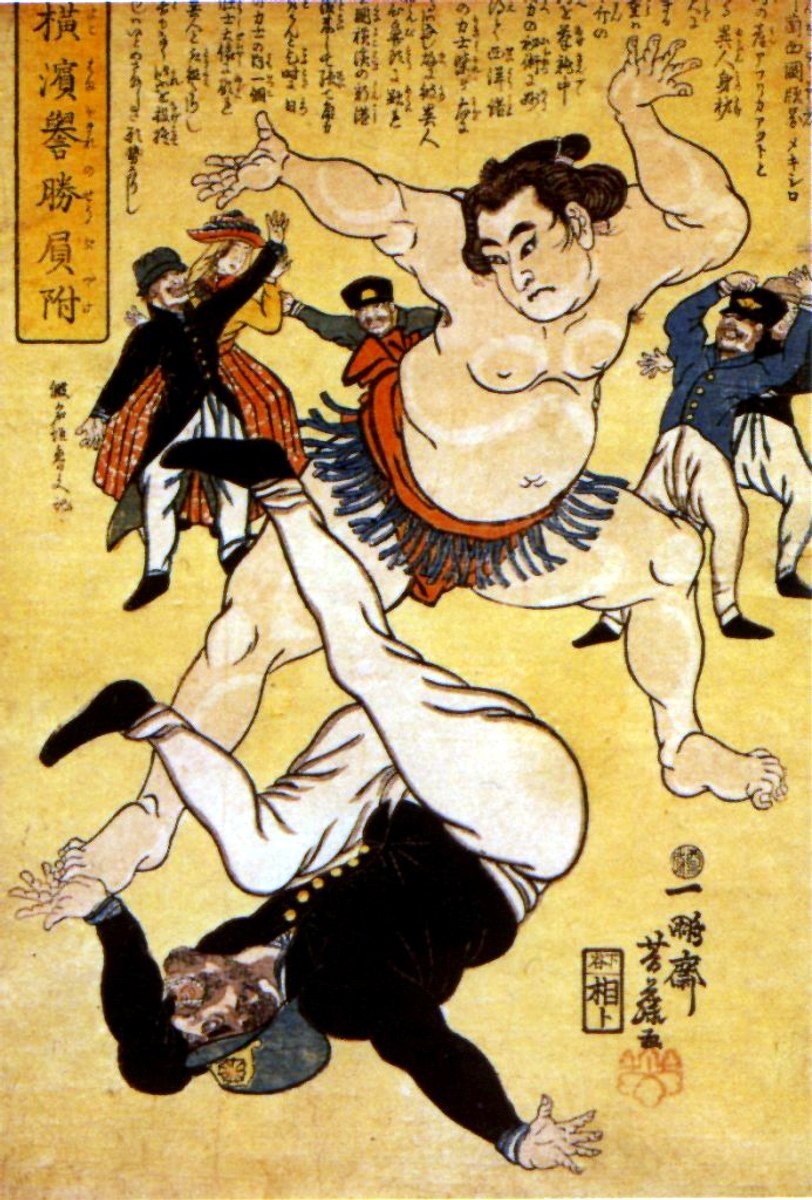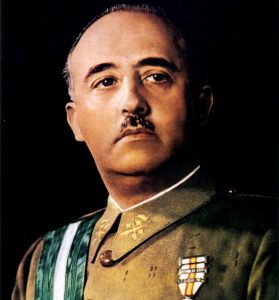Don’t you mean Shinzo Abe? Well, no. That’s not the name of the Prime Minister of His Most Imperial Majesty. It is Abe Shinzō, the extreme right-wing ethno-nationalist. The convention in Confucian Asia is the surname comes first and the prénom comes second. Abe being a storied surname. For many years the Japanese have accommodated English speakers, and presumably other languages other than Chinese and Korean, in official correspondence and publications by using the more common convention of prénom and surname in that order. Ever polite, as the Japanese endeavor to be, especially to guests, the Japanese are ending that accommodation in favor of ethno-nationalism and defense of their culture. (h/t author William Flynn)

Abe Shinzō Barbarian Subduing Generalissimo Of The Most Ethno Of Ethno-States
Japan will start using the traditional order for Japanese names in English in official documents, with family names first, a switch from the Westernised [sic] custom the country adopted more than a century ago, government officials said Friday (Sept 6).
The idea has been floated for years, most recently by foreign and education ministers in Prime Minister Shinzo Abe’s ultra-conservative Cabinet. The Cabinet agreed Friday to begin making the change with government documents, though no timeline was given for its start.
“It is important for all of us in the world to recognise [sic] language and cultural diversity as we live in an increasingly globalised [sic] society,” said Education Minister Masahiko Shibayama, a vocal supporter of the move.
“It is significant to make a change per Japanese tradition and write family name before the first name.”
Chief Cabinet Secretary Yoshihide Suga said usage guidelines and other details still need to be discussed further. Mr Suga said he looked forward to going by Suga Yoshihide, as he is known in Japan.
[Japan To Put Surname First For Japanese Names In English, unattributed, Straits Times, September 6, 2019]
No doubt the infiltrators at the National Review will find this effort to return to a Japanese standard of presenting names as a return to fascism. NRO is constantly finding fascists under the futon. To think that they were once an anti-communist publication.
That is not to say that all is well in one of the leading ethno-states. Infiltrators are targeting the support regular Japanese, and some gaijin, show for a Japanese Japan.
A graduate student at Hitotsubashi University has filed a human rights complaint against an American associate professor who is said to have repeatedly used hate speech against Koreans during classes, it has emerged.
Ryang Yong-Song, a 37-year-old “Zainichi” Korean resident of Japan, filed the complaint with the Kunitachi Municipal Government in the western suburbs of Tokyo on Aug. 1 based on the city’s ordinance banning ethnic discrimination.
According to the complaint, the male associate professor, who is in his 50s, made generalizations about Koreans in expletive-filled English when railing against a specific student at the beginning of a May 6 class, saying, “(The student is) absolutely crazed, like most, like most Koreans, I mean, just a f—— idiot. So, if you are recording this, in my opinion, Koreans are (a) bunch of f—— idiots!” He is also said to have slandered Koreans at the outset of another class on June 4.
[Tokyo Student Files Human Rights Complaint Against Professor’s Anti-Korean Hate Speech, unattributed, Mainichi, August 3, 2019]
Korean infiltrators are an ongoing problem in Japan. The Zainichi Koreans are those who came to Japan during the period of Japanese rule of Korea and never left. Nor did they acculturate. Note that even the liberal reporter so concerned about hate speech immediately identified Ryang as a Zainichi, because even liberal Japanese instinctively know the problem of angry unassimilated Koreans in Japan. Such Zainichi are always concerned about being Korean, much like the modern Black in America, always searching for offense. And just as the Blacks here justify their failings due to the legacy of slavery and Jim Crow, so the Zainichi always attributes his failing and anger to the legacy of Japanese imperialism. And angry they are, similar to the problem the United States has with Korean shooters like Cho Seung-Hui, the Virginia Tech Shooter and One Goh-Ko, the Oikos University Shooter. Note that Ryang does not even have a Japanese prénom though it is likely he is a 3rd generation Korean. This is common in Japan and the Japanese see it as an insult. Interestingly, the Japanese are fine with such infiltrators learning Japanese and changing their names to Japanese names. Those immigrants who truly want to assimilate do. There are a small number of Zainichi who do this and because of the racial similarity between Japan and Korea, most of the original humans who settled Japan came from the Korean peninsula, are able to disappear into Japanese society. And for Ryang himself, despite his Koreanness, he does not go back to Korea, because if he did, he would have to do his military service, which he is avoiding like the plague.
And Globo-Homo is hard at work in Japan, hate speech laws are proliferating, though Abe and his party are having none of it.
Towns, cities and prefectures have been taking faster action than the central government to eradicate ethnic discrimination since the 2016 enactment of the law against hate speech.
Despite progress in municipalities where a sense of crisis is growing, including Kawasaki, the western Tokyo suburb of Kunitachi and Osaka, some governments say there is only so much that can be done without state action. And those reluctant to take tougher steps are conscious of the need to protect freedom of speech.
Hate speech often includes threats to kill people of certain nationalities, insults — such as comparing certain groups to cockroaches or other creatures — and alienating remarks like “Go back to your home country.”
The 2016 law is designed to deter hate speech but lacks provisions to ban or punish the use of discriminatory language.
To make up for that, a draft ordinance unveiled by Kawasaki City Hall on June 24 stipulates criminal penalties for discrimination, a first by any municipality in Japan.
According to the draft, discriminatory remarks targeting a person from a specific country or region would be banned from being made in streets, parks, railway stations and other public spaces. Repeat violators would be punishable by fines of up to ¥500,000 ($4,600).
[Japan Playing Catch-Up With Proactive Local Governments In Fight Against Hate Speech, unattributed, The Japan Times, July 25, 2019]
Shōgun Abe and his party appear to know the score though. They know that hate speech laws will be used against the Japanese, or based gaijin, in order to hurt the historic Japanese nation, so they are resisting as they can the rush to criminalize the criticism of invaders. Abe is saying no to Globo-Homo and certainly does not want Japan hating infiltrators undermining the Land of the Rising Sun. Sonno Jo I – Revere The Emperor, Expel The Barbarian!


6 thoughts on “The Japan That Can Say Abe Shinzō”